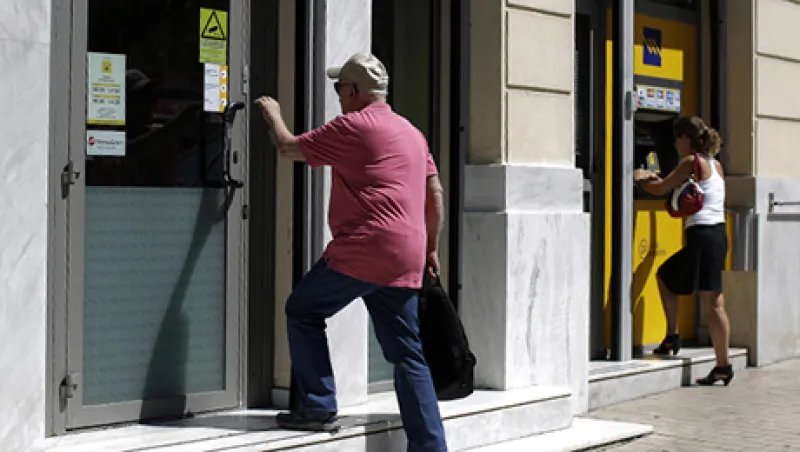After being shuttered for three weeks, Greek banks reopened their doors Monday. That’s hardly cause for rejoicing, though. Serious questions loom about their solvency and need for new capital, as well as the potential need for a bail-in that could wipe out some depositors, creditors and investors.
“The banks are probably insolvent,” says Steve Hanke, professor of applied economics at Johns Hopkins University in Baltimore and director of the Troubled Currencies Project, a group at Washington-based think tank Cato Institute.
Many observers take a dim view of the banks’ health. Fitch Ratings estimates that Greece’s four largest banks — National Bank of Greece, Piraeus Bank, Eurobank Ergasias and Alpha Bank — will need €25 billion ($27 billion) in new capital when they formally write off nonperforming loans and are required to increase capital reserves. The four banks, which represent 87 percent of bank assets in Greece, raised their nonperforming loan exposures by €26.6 billion for the first quarter of 2015 after adopting the European Banking Authority’s stricter definition of loan nonperformance.
That was before the bank shutdown and the government’s tense standoff with its European Union creditors, events that dealt a fresh blow to the economy and could aggravate the banks’ bad-debt problems. The Foundation for Economic & Industrial Research, an Athens think tank, predicted Thursday that the economy would contract by 2 to 2.5 percent this year and remain in recession through 2016. “I expect loan performance to have worsened further in the second quarter,” says Regina Argenio, credit analyst at Standard & Poor’s in Milan.
The government shut the banks down on June 29 to avoid a potential collapse in case of a flood of withdrawals. Deposits at Greek banks had fallen by 20 percent over the preceding six months, from €213.4 billion in November 2014 to €170.5 billion in May 2015. Capital controls remain in place. Instead of a daily withdrawal limit of €60, the cap in force during the closure, depositors can now make a single €420 weekly withdrawal. Customers are still unable to make payments or wire transfers abroad, however.
The European Central Bank will conduct stress tests to determine how much, if any, additional capital Greek banks need, according to Argenio. Any determination that Greek banks need new capital could trigger a bail-in. “It could mean that depositors and equity holders and credits could suffer losses before banks can receive capital,” she says. “Theoretically, the shares could be reduced to nothing, which happened in the case of Cyprus.” The terms of any bail-in would likely involve negotiations among the ECB, the Bank of Greece and the Greek government, she adds.
The July 12 agreement between Greece and its EU partners stipulates that €10 billion to €25 billion of a proposed €86 billion new bailout should go toward bank recapitalization, with €10 billion available immediately through the European Stability Mechanism. The countries are due to begin negotiations on the bailout program in Athens on Friday, scheduled after the Greek parliament on Wednesday approved justice system and banking reforms demanded by the EU.
One major investor in Greece remains optimistic about the outlook. Talk of the need for major new capital injections is premature and misguided, says Wilbur Ross, chair and CEO of New York–based WL Ross Holding Corp., who led an investor group that bought €1 billion of shares of Bank of Cyprus in June 2014 and €1.3 billion of shares of Eurobank Ergasias.
“Fears of a big recapitalization becoming necessary are largely based on the pattern in Cyprus, and the analogy to Cyprus is simply wrong,” Ross says. In Cyprus political opposition delayed bankruptcy reform and in the process drove some borrowers to choose to strategically default ahead of any changes in the law designed to make defaulting more difficult. Also, the bail-in of depositors harmed the liquidity of Cyprus’ banks, he adds. In contrast, Greek banks have a very high 60 percent level of provisioning against nonperforming loans, reducing the amount of new capital that might be required. “If the Greek banks were to need more capital,” says Ross, “it is not at all clear that equity dilution would be necessary” because the banks could instead issue preferred stock or subordinated debt, given that they currently have very little of either form of capital.
Yet signs of stress in the system are evident. Johns Hopkins’s Hanke cites an indicator known as the Texas ratio, a simple measure of bad loans plus foreclosed real estate as a percentage of tangible equity and reserves. At the end of 2014, the Texas ratio for Greece’s four largest banks was already at or above 100 percent, indicating that bad loans and real estate exposure could wipe out their equity. Furthermore, a large portion of the banks’ capital is made up of tax-deferred assets — “phantom capital,” says Hanke — that have value only when the institutions are profitable.
Though Greek banks were able to raise €8.3 billion in new equity in 2014, raising more capital from private investors now “is just not going to happen,” Hanke says. Shares are far below book value, and new shares would dilute them further. The option of going to the Greek government for capital injections is “improbable,” he says, because the government has no money. A third option would be for the European Union to recapitalize the bank and in effect take ownership of the Greek banks, but the high price tag may make that a tough political pill to swallow, he adds.
Euro zone authorities are rightly focused on ensuring that Greek banks will be adequately capitalized, according to Hanke: “Without the four largest banks functioning, you have an engine shut down that normally supplies 87 percent of the money in the system.”
Get more on banking.






